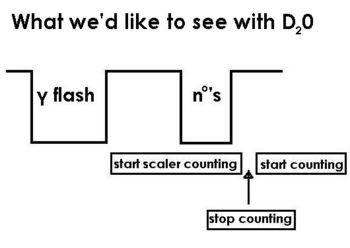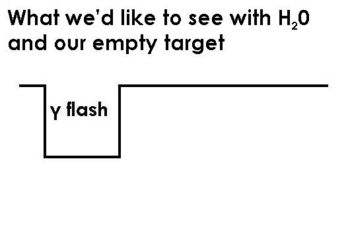Difference between revisions of "Electronics We Need to Collect"
Jump to navigation
Jump to search
| (3 intermediate revisions by the same user not shown) | |||
| Line 9: | Line 9: | ||
1/V = 10nsec/foot => Detector must be > 5 feet from target. | 1/V = 10nsec/foot => Detector must be > 5 feet from target. | ||
| − | Discriminating Signals | + | ==Discriminating Signals== |
[[Image:what we'd like to see with d20.jpg|left|350 px|What we'd like to see with D20]] [[Image:what we'd like to see with h20.jpg|right|350 px|What we'd like to see with H20 and our empty target]] | [[Image:what we'd like to see with d20.jpg|left|350 px|What we'd like to see with D20]] [[Image:what we'd like to see with h20.jpg|right|350 px|What we'd like to see with H20 and our empty target]] | ||
| + | |||
| + | |||
| + | |||
| + | |||
| + | |||
| + | |||
| + | |||
| + | |||
| + | |||
| + | |||
| + | |||
| + | |||
| + | |||
| + | |||
| + | |||
| + | |||
| + | |||
| + | |||
| + | |||
| Line 42: | Line 61: | ||
** 1 mm beam size | ** 1 mm beam size | ||
** No Conduction | ** No Conduction | ||
| − | * Radiated cooling | + | ** Radiated cooling |
| + | |||
| + | |||
| + | -These are the notes from the July 15th, 2008 meeting. | ||
| + | |||
| + | [http://wiki.iac.isu.edu/index.php/PhotoFission_with_Polarized_Photons_from_HRRL Go Back] | ||
Latest revision as of 06:25, 5 February 2009
It'll hit our target and neutrons will be collected.
B n o = .1
P n = 1.04 MeV/c
1/V = 10nsec/foot => Detector must be > 5 feet from target.
Discriminating Signals
What We Need
- n o detectors
- High voltage
- Splitters
- Discriminators
- Scalers
- NIM bin
- FAN
- Oscilloscope
- Delay
- Cables
What Else Needs to be Done?
- Round up electronics
- Set up electrons
- NIM bin
- Mounting system
- Polarization
- Find as many scalers as possible.
- Check Dr. Dale's calculations
- Given the collimator's 17" -> can the electron which makes a neutron get through the collimator?
- Will it burn a hole through the collimator?
- 1 KH
- 50 nsec pulse width
- 80 MA peak current
- 1 mm beam size
- No Conduction
- Radiated cooling
-These are the notes from the July 15th, 2008 meeting.


